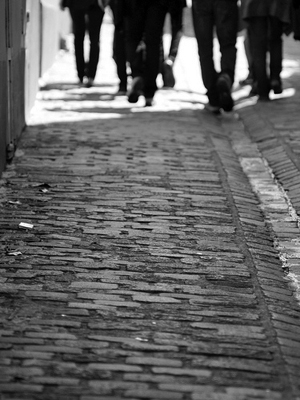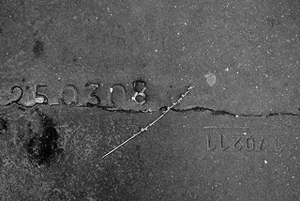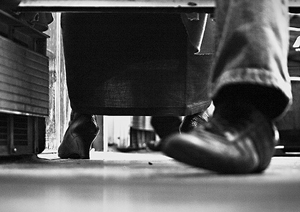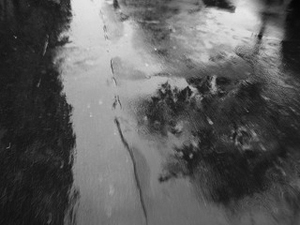Street

- SUBSCRIBE
- ALREADY SUBSCRIBED?
BECOME A BONJOUR PARIS MEMBER
Gain full access to our collection of over 5,000 articles and bring the City of Light into your life. Just 60 USD per year.
Find out why you should become a member here.
Sign in
Fill in your credentials below.
 Yes, I know, of course I do. This street isn’t old, not by the standards of Paris, but it’s been around for a hundred fifty years, since they tore down the slaughterhouses that had defined and perfumed the neighborhood and put up houses and named it for a saint—though which one is hard to tell because there are six saints named Irénée, most of them bishops at one time or another long ago and martyrs to boot. To avoid confusion, they moved Saint Irénée and renamed this street, like three others in the immediate area, after generals and a colonel who, by losing their battles (and battalions) in the Franco-Prussian war, improved their chances of becoming eponymous by dying on the field of honor. This particular general had an unusual name.
Yes, I know, of course I do. This street isn’t old, not by the standards of Paris, but it’s been around for a hundred fifty years, since they tore down the slaughterhouses that had defined and perfumed the neighborhood and put up houses and named it for a saint—though which one is hard to tell because there are six saints named Irénée, most of them bishops at one time or another long ago and martyrs to boot. To avoid confusion, they moved Saint Irénée and renamed this street, like three others in the immediate area, after generals and a colonel who, by losing their battles (and battalions) in the Franco-Prussian war, improved their chances of becoming eponymous by dying on the field of honor. This particular general had an unusual name.
And I know, I know, that in the course of a hundred fifty years the streets and the sidewalks have not been constant. Cobbles and Belgian blocks have been ripped up to make way for brick or concrete and finally for blacktop, and who knows how many versions of each material there have been. Yet a street, I believe, runs deeper than its surface, has nerves, maybe a soul, but the nerves for sure and maybe even some roadway equivalent of a lizard brain that can store impressions, sensations, just as we can feel and remember being touched or struck or cut with the blade of a knife.
So I wonder. If I put my feet down carefully, one after the other, and just gently enough and if it’s peaceful all around me without distractions, will I be able to feel a hundred fifty years’ worth of footsteps pressing back up against mine from the nerves or the soul of the street? Is this street, though it’s un sens unique, running from west (more or less) to east (same), really two ways when it matters? Does it still have a store of impressions of horses’ hooves and iron-rimmed wagon wheels to answer the rubber of the cars and the poussettes of young mothers? Does it have recollections of the plop of horse manure or just the more recent residue of dogs? Can it recall gentlemen’s walking sticks and the tips of ladies’ parasols or only umbrellas after the rain has stopped and the foppish or old-fashioned pretend they are nineteenth-century flâneurs and rhythmically tap the ground with them as they make their way wherever their way may be taking them?
 Does it remember my footsteps, mine? Can it sort them out from all the tens of thousands of others, remember my left foot and right foot from last week or seven years ago? And can it push up against them or at least reflect them like a mirror now? I want to think so. It would be comforting, having spent such a long time on this street and in this quartier, that we know each other, the pavement and I—that we are old friends or at least nodding acquaintances, like the éboueurs I see early on my way to the bakery, the short, bearded man with an old briefcase going to the bus stop mid-morning, the two arabes du coin at the end of the street. Yes, I think so.
Does it remember my footsteps, mine? Can it sort them out from all the tens of thousands of others, remember my left foot and right foot from last week or seven years ago? And can it push up against them or at least reflect them like a mirror now? I want to think so. It would be comforting, having spent such a long time on this street and in this quartier, that we know each other, the pavement and I—that we are old friends or at least nodding acquaintances, like the éboueurs I see early on my way to the bakery, the short, bearded man with an old briefcase going to the bus stop mid-morning, the two arabes du coin at the end of the street. Yes, I think so.
Or maybe I’ve convinced myself that I should think so… that it should be so, that I really can feel what I believe I should be able to feel. Or (again) maybe I should go out and come in again and say, Well, I think I feel those feet, I think they know my feet. Or (finally) maybe I could say, Well, I’m pretty sure and, anyway, I feel at home here. I will.
Comforting, as I said, but I get to wondering if I can feel (or believe I feel) the same sensation of my previous footsteps pressing back against mine and greeting me as an old friend elsewhere, in places where I used to live—used to and not recently. Do I want to do this? Do I have a choice? I want to know… want to know I’m not delusional or simply sentimental and the only answer to this question is like the solution to Zeno’s paradox: solvitur ambulando. I take a walk early in the morning, heading west to where I used to live, over in the Second Arrondissement, not far from the Opéra Garnier.
The narrow, meandering streets inside this triangle formed by three rather grander avenues and boulevards are not, I’m pretty sure, the most tangled or irrational in Paris, and I remember wandering around here years ago with my eyes half closed, but always finding my way, the route from here to there, the easiest in or out, depending. Not today, not this time. I find myself looking at the street signs, squinting at them as if a narrower focus will tell me more about where the street will take me or remind me what’s at the far end. No use. It doesn’t look the same. I spend an hour and then some walking up and down different streets—there are about twenty crowded in here—going left, going right, backtracking occasionally, trying to remember something, nothing specific, just something familiar.
 If I have found one of the hotels I lived in, it has sprouted another couple of floors and has become splendid or at least piss-elegant. The desk clerks are no help: the time I’m talking about is long before theirs, and maybe they think I’m lost. They’re partially right. The same at another hotel and an apartment house. The cave that sold cheap wine—the deposit on the bottle cost more than the wine inside it—has become a Thai restaurant, the charcuterie is gone and I can’t begin to figure if it’s the lamp store, the snotty little pâtisserie or a hairdresser that sits where it used to be… if it used to be on this street at all. And my feet haven’t felt a thing. Time to go, get the hell away from the smoking wreck of an experiment, to run for my life.
If I have found one of the hotels I lived in, it has sprouted another couple of floors and has become splendid or at least piss-elegant. The desk clerks are no help: the time I’m talking about is long before theirs, and maybe they think I’m lost. They’re partially right. The same at another hotel and an apartment house. The cave that sold cheap wine—the deposit on the bottle cost more than the wine inside it—has become a Thai restaurant, the charcuterie is gone and I can’t begin to figure if it’s the lamp store, the snotty little pâtisserie or a hairdresser that sits where it used to be… if it used to be on this street at all. And my feet haven’t felt a thing. Time to go, get the hell away from the smoking wreck of an experiment, to run for my life.
I start back the way I came, looking sourly at the uncooperative sidewalk. Someone calls my name. It takes a moment to realize he’s the friend of someone I met at a party in the apartment of a friend of a friend of mine, a Brit. Real close, eating off the same spoon. But he looks cheerful and that might help my mood. I remember his name is also Joseph, so maybe a conversation will be like talking to myself. Could be worse, I guess.
After the hello-how-are-you-which-way-are-you-going, he gets into step with me on my left side and, for a while, says nothing. As we stop to wait to cross a street, he looks right at me and says, “ What’s wrong? You look down. That’s not like you.” I wonder how he’d know that. I tell him, Well, the sky was the same, anyway. He screws up his face. “That’s from a poem, isn’t it?” No, a song, an old one. I quote it too often, I think. Sorry. It’s funny, or maybe just annoying, how a line from an old song which was at best cheap romanticism when it was written can start to seem like something important. As if it explains. It doesn’t. I just don’t know what else to say. Except it was a dumb idea.
 He wants to know the dumb idea. I could tell him that I’ve come back to look over a neighborhood I used to know perfectly well, where with my eyes closed I could tell you all the shops on the far side of the street and tell you where the panhandler used to sit and on what days the flour truck made deliveries to the baker. And now, À part le ciel, je n’ai rien reconnu… I recognized nothing but the sky. And what would he say? You know as well as I. Things change, that’s the way it is, you can’t go home again, progress like it or not, something like.
He wants to know the dumb idea. I could tell him that I’ve come back to look over a neighborhood I used to know perfectly well, where with my eyes closed I could tell you all the shops on the far side of the street and tell you where the panhandler used to sit and on what days the flour truck made deliveries to the baker. And now, À part le ciel, je n’ai rien reconnu… I recognized nothing but the sky. And what would he say? You know as well as I. Things change, that’s the way it is, you can’t go home again, progress like it or not, something like.
But I didn’t come to do that, not at all. It was about the feet, remember? Or about footsteps and about memory, mutual memory, mine and the street’s, about home. I don’t know what I’d say if someone told me that. Probably nothing. Maybe I wouldn’t understand if I were this other Joseph. I’m not sure I understand it myself.
Well, I tell him, it was just an idea. Maybe it wasn’t dumb. Maybe it was just a daydream or a hope. “Oh, I know. That happens. You think you’ve got something, right in the palm of your hand. And then it’s not there.” I think that’s what he says. I nod, ask which way he’s going. I say goodbye and go off in the opposite one, heading home more or less, watching the sky as it changes from afternoon to early evening and the soft white clouds turn gray over the roof tiles. Sure, it’s all the same. The narrow streets as I look up run parallel to the sky. Either one or the other will guide me home or get me completely lost.
photo 1 by Francisco Gonzalez [CC BY 2.0], via Flickr
photo 2 by Groume [CC BY-SA 2.0], via Flickr
photo 3 by James Mulholland [CC BY-SA 2.0], via Flickr
photo 4 by Pat Guiney [CC BY 2.0], via Flickr
More in french life, Paris, Paris life

